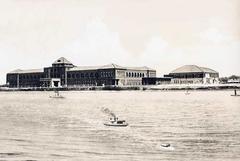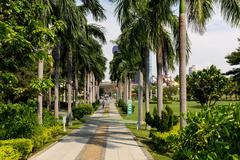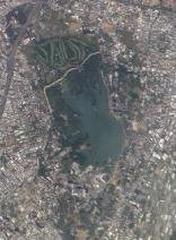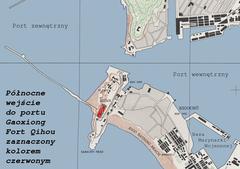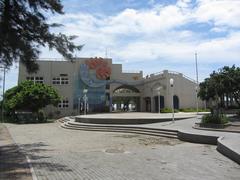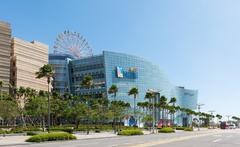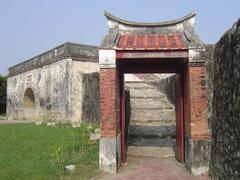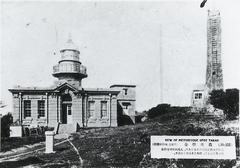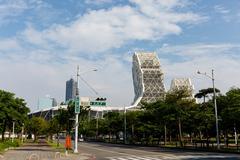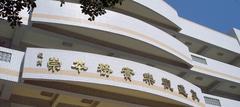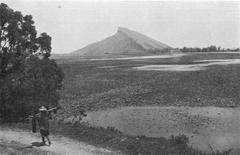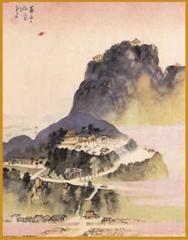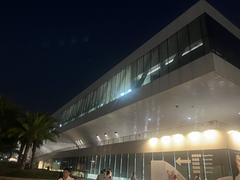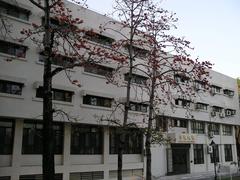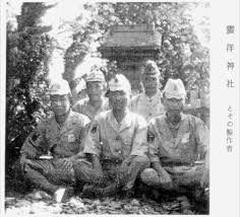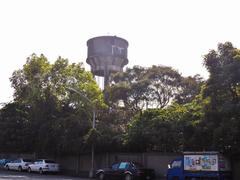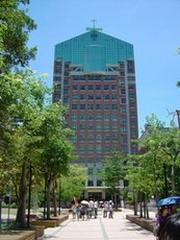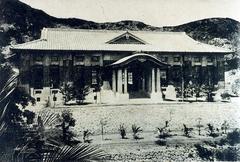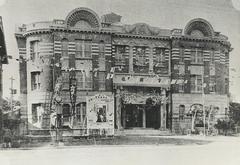Japan-Taiwan Exchange Association Kaohsiung Office Visiting Guide: Tickets, Hours, Services, and Tips
Date: 03/07/2025
Introduction
The Japan-Taiwan Exchange Association (JTEA) Kaohsiung Office stands as a cornerstone for Japan-Taiwan relations, especially within southern Taiwan. Established in 1972 following the shift in Japan’s diplomatic recognition to the People’s Republic of China, the JTEA maintains unofficial but robust ties with Taiwan, acting as Japan’s de facto consulate. The Kaohsiung Office, located in the heart of this bustling metropolis, provides essential consular services, promotes cultural exchange, and facilitates economic and academic partnerships for regions including Yunlin, Chiayi, Tainan, Kaohsiung, Pingtung, Taitung, and Penghu.
This guide delivers detailed insights into the history, significance, visiting protocols, and services of the JTEA Kaohsiung Office, alongside practical travel tips and highlights of nearby historical and cultural attractions. Whether you are a Japanese national, Taiwanese resident, or international visitor, this resource will help you navigate your visit and deepen your understanding of the dynamic Japan-Taiwan relationship.
For further information, consult official resources and guides at the JTEA Kaohsiung Office website and related platforms (Focus Taiwan, My Kaohsiung, Medical Taiwan).
Historical Background and Role
Origins and Diplomatic Context
The JTEA was founded in 1972 after Japan’s formal diplomatic ties with Taiwan ended. It replaced the official embassy and continues to sustain Japan-Taiwan relations through unofficial yet effective means, a model that later influenced other countries’ approaches to Taiwan.
Institutional Structure: Kaohsiung Office
With primary offices in Taipei and Kaohsiung, the JTEA serves as Japan’s de facto diplomatic mission in Taiwan. The Kaohsiung Office specifically covers southern regions and provides comprehensive consular services, trade facilitation, cultural programs, and academic support.
Evolving Functions
Over the decades, the JTEA has expanded its scope to encompass not just diplomatic and consular work, but also disaster prevention, trade and investment, and support for Taiwan’s participation in international affairs.
Significance and Services
Bilateral Cooperation
The Kaohsiung Office is pivotal in driving bilateral cooperation, supporting over 50 agreements across sectors such as fisheries, taxation, and economic exchange.
Disaster Prevention and Mutual Aid
Disaster prevention is a major focus, with forums like “Japan-Taiwan Disaster Prevention Week” and memoranda fostering knowledge exchange on earthquake and public safety preparedness.
Economic and Cultural Exchange
JTEA initiatives support collaboration in sectors such as semiconductors, energy, AI, and foster cultural events and educational opportunities that bridge the two societies.
Visiting the JTEA Kaohsiung Office
Location and Contact Details
- Address: 9F, No. 87, Heping 1st Road, Lingya District, Kaohsiung City, Taiwan
- Phone: (07) 771-4008
- Official Website: Japan-Taiwan Exchange Association Kaohsiung
The office is located in a convenient commercial district, close to public transportation, hotels, and shopping centers.
Office Hours
- Monday to Friday: 9:00 AM – 5:00 PM
- Closed: Weekends and public holidays observed by Japan or Taiwan
It is advisable to check the official website or call ahead for updates.
Entry Requirements
- ID Required: Valid photo identification (e.g., passport, ARC)
- Security: Standard screening, including bag checks and possible inspection of electronic devices
- Appointments: Strongly recommended for consular services; walk-ins may be accepted for general inquiries but are subject to availability
Services Provided
- Consular Services: Passport renewals, notarial services, emergency assistance for Japanese nationals
- Visa Information: Guidance on tourist, business, and student visa applications to Japan
- Cultural Exchange: Support for Japanese language classes, cultural events, and educational opportunities
- Economic Relations: Business support, trade mission facilitation, and market insights
- Crisis Response: Coordination with local authorities during emergencies
More details and downloadable forms are available on the official website.
Access and Transportation
By MRT
- Nearest Station: Sanduo Shopping District Station (R8, Red Line), a 10-minute walk from the office
- Directions: Exit the station, head west along Sanduo 3rd Road, then turn right onto Heping 1st Road
- The Kaohsiung MRT is modern, with English signage (Kaohsiung travel blog)
By Taxi
- Readily available; fare from Kaohsiung Main Station is approximately 150–200 NT$
By Bus
- Several city bus routes stop near Heping 1st Road; EasyCard is accepted
Parking
- Paid lots and street parking are nearby, though space may be limited during peak hours
Language and Accessibility
- Languages: Japanese and Mandarin are primary; some staff speak English
- Accessibility: The building is wheelchair accessible; notify the office in advance if special assistance is required
Nearby Amenities
Accommodation
- Options range from luxury hotels to budget hostels, especially near major MRT stations
- Average Rates: Luxury hotels (9,350–13,350 NT$), mid-range (4,000–6,700 NT$), budget (1,070–2,000 NT$)
Food and Shopping
- The Sanduo Shopping District offers diverse dining and retail choices, including Japanese cuisine
Other International Offices
- Neighboring offices include the American Institute in Taiwan and Manila Economic & Cultural Office (My Kaohsiung)
Cultural Etiquette and Practical Tips
- Dress business casual for official visits
- Arrive on time for appointments
- Photography inside the office is not permitted
- Remain respectful and courteous at all times
Safety, Health, and Currency
- Kaohsiung is generally safe; hand sanitizer is provided at the entrance
- Masks may be required during health alerts
- Currency: New Taiwan Dollar (NT$); cash is common, credit cards widely accepted in larger businesses; use EasyCard for transit
Useful Travel Information
- Weather: Best visited from September to January (cool, dry); summers can be hot and rainy with possible typhoons
- Electricity: 110V, 60Hz; bring adapters if necessary
- Emergency Numbers: 119 (fire/ambulance), 110 (police)
Frequently Asked Questions
Q: What are the office hours?
A: Monday to Friday, 9:00 AM to 5:00 PM. Closed on weekends and public holidays.
Q: Do I need an appointment?
A: Appointments are recommended for consular services; walk-ins may be accepted for general inquiries.
Q: Is the office wheelchair accessible?
A: Yes, there are elevators and accessible facilities.
Q: What identification is required?
A: Bring a valid photo ID such as a passport or ARC.
Q: What payment methods are accepted?
A: Most services require cash; confirm with the office for specifics.
Visual Resources
High-quality images of the office exterior/interior and maps are available on the official website.
Related Articles
Nearby Historical and Cultural Attractions
Pier-2 Art Center
- Revitalized Japanese-era warehouses; contemporary art and outdoor installations
- Hours: Daily, 10:00 AM–6:00 PM; free entry (some exhibits may charge)
Former Japanese Navy Fongshan Radio Station
- Historical landmark from the colonial era; minimal admission fee; limited accessibility
Takao Renaissance Association
- Heritage site in a Japanese-era residence; free weekday entry
Lotus Pond
- Scenic lake with famous temples; open 24/7; free entry
Cijin Island
- Historic forts, seafood markets, and Japanese-influenced architecture; accessible by ferry
British Consulate at Takao
- 19th-century consulate, harbor views; entry fee applies
Kaohsiung Museum of Fine Arts
- Taiwanese and international art; free general admission
Night Markets
- Taiwanese and Japanese-inspired street food; vibrant nightlife
Practical Travel Tips
- Best Time: Spring and autumn for comfortable weather and festivals
- Transport: MRT and buses are reliable; bike rentals available at Pier-2 Art Center
- Language: Mandarin is primary; Japanese and English common in tourist areas
- Etiquette: Remove shoes in temples, dress modestly, and follow local customs
Conclusion
The JTEA Kaohsiung Office is a vital resource for consular services and a cultural bridge between Japan and Taiwan. While not a tourist attraction, its public events and collaborations enrich the local community and offer unique insights for visitors. For a smooth visit, schedule appointments, bring required documents, and take time to discover Kaohsiung’s rich blend of historical and modern attractions.
Stay connected by following the JTEA Kaohsiung Office on social media, visiting their website, and downloading the Audiala app for real-time updates on consular services and cultural events.
